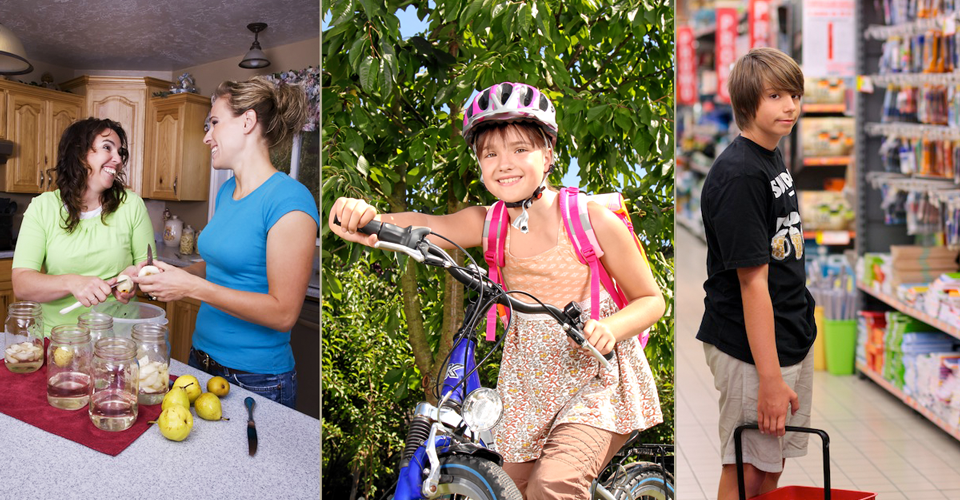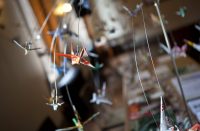It’s hard to believe, but summer vacation is almost over and school will be starting soon. Okay, I may be a few weeks too early to really mean that, but that’s how it feels. Here are ten tips for dealing with food preparation, back-to-school shopping and keeping a green lifestyle once school starts. As someone who lives in a house with a baby, a grade eight student and a bunch of adults, I’ve tried to make the tips apply whether you’re a parent with school-age children or a university student.
It’s hard to believe, but summer vacation is almost over and school will be starting soon. Okay, I may be a few weeks too early to really mean that, but that’s how it feels. Here are ten tips for dealing with food preparation, back-to-school shopping and keeping a green lifestyle once school starts. As someone who lives in a house with a baby, a grade eight student and a bunch of adults, I’ve tried to make the tips apply whether you’re a parent with school-age children or a university student.
Food
1. Because our CSA runs into the fall, we won’t be doing big trips to the grocery store for a few more months still. So, we just put in a bulk food order through the Ontario Natural Food Co-op to stock up for when school starts. Getting a case of Peanut Butter Puffin cereal may seem a little overboard, but it’ll be nice to have breakfast taken care of for a few months (plus it was on sale!). Other staples that we bought? Granola bars, an 11kg bag of rice, a case of dry spaghetti noodles and ready-to-heat shepherd’s pies for those evenings when there’s no time to make dinner.
2. If you want to avoid the garbage that comes with granola bars and pre-packaged cereal, take a weekend before school starts and prep a bunch of snacks. Homemade granola bars and muffins are great to prep ahead of time and store in the freezer. I currently have 75lbs of peaches sitting in my kitchen that I plan to freeze this weekend; we’ll put a few slices into a container every school night and by first nutrition break the next day they should be defrosted and delicious.
3. To take the snack prepping a step further, get a bunch of meals ready to go in the freezer (at this point you may also want to invest in a bigger freezer!). Casseroles, lasagnes, shepherd’s pies, burgers (vegetarian or meat) & pizza dough will all come in handy if your family is the type to be running from an extracurricular activity to soccer practise to piano lessons. If you’re as busy in the summer as you are in the fall, perhaps just take an hour and prep a few weeks of meal plans. Then you’ll at least be able to breathe easy when you do the grocery shopping.
Clothing & Supplies
4. Back-to-school clothes shopping is important for many young folks, but check out Fashion Forward and Eco-Chic Fashion for some tips on how and why to avoid buying new clothes. Try to go to thrift stores first, but if it’s necessary to get something new, check out a fair trade store near you (tip for Kitchenerites: a new fair-trade shop opened downtown this summer, More Than Half). And remember that some thrift stores are better than others at stocking up-to-date styles, so do some asking around before you start hitting them up.
5. School supplies present another challenge, since so many of them are made with plastic. Try posting a notice on Freecycle or Kijiji that you’re looking for extra paper, pens, highlighters, binders, or whatever else you need, and see if anyone will donate their extras to you. Perhaps someone recently graduated university and would be happy to unload their no-longer-needed items.
6. If you or your kid need potentially big-ticket items that you’re having trouble finding used in good quality, buy from retailers that have solid reputations for social responsibility. Noticing a trend here? Mountain Equipment Co-op is always a good bet for backpacks and outerwear, as they give more details about the origins of the items than most retailers. To find a desk or other furniture, you might want to wait until the spring – just drive around the university or college neighbourhoods of your city until you see something you like on the curb.
7. In elementary and high school they provide books and textbooks for students, but if you’re in university or just want extra study materials for your kindergartener, again, try finding them used first. I picked up some grade two math books when a local used bookstore went out of business, and now I only have to wait seven years to use them! If you’ve got a friend a year or grade older than you, ask if you can inherit their books when they move on.
8. Perhaps this is the year where you really need to replace your 10-year-old laptop, or perhaps your 12-year-old is finally going to get his own cellphone. How do you find sustainable electronics? Well, start by checking out Greenpeace’s Guide to Greener Electronics. Try to make a pledge to hold onto anything you buy for as long as possible instead of upgrading after a year, and be sure to recycle any old electronics that you may be getting rid of.
Lifestyle
9. At Meet the Teacher night, you might want to tell your kids’ teachers some details about your eco-friendly lifestyle. Teachers might be interested in making changes in their classrooms, and you could suggest that your kids would love to help out! If you’re in high school or university, don’t be afraid to politely engage your instructors and classmates, or even school administrators, about issues like wasting paper and energy.
10. Make a collective decision to drive less and walk or bike more. If you already walk or bike to school, start up a commuting group and offer to walk or bike other kids in the neighbourhood to school. If you’re in university and know someone who drives less than 5kms to get to campus, offer to help them find a bike and show them the ropes of cycle commuting, or take the bus with them (even if it means getting up for their 8:30am class when you don’t have to be on campus until noon).
This post is part of the Better Back to School Brigade organized by David Suzuki Foundation’s Queen of Green.
Emily is former A\J web editor and a graduate of Environmental Studies at Wilfrid Laurier University. Emily is an urban homesteader who tries to live as plastic-free, local and organic as possible, and can be intense about it.














